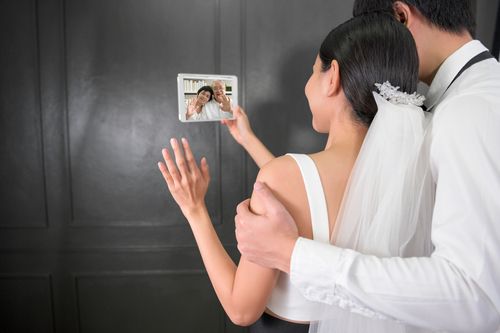 Want to tie the knot? Are obstacles getting in your way from making it legal? Some couples in challenging situations opt for online virtual weddings. You may know them as “Zoom weddings,” which grew in popularity during the first few months of the COVID-19 pandemic. But are they legal? It depends on where you get married and how you host your event. Keep reading to find out the fascinating and complex answer to the common question, “Can you get married online?”
Want to tie the knot? Are obstacles getting in your way from making it legal? Some couples in challenging situations opt for online virtual weddings. You may know them as “Zoom weddings,” which grew in popularity during the first few months of the COVID-19 pandemic. But are they legal? It depends on where you get married and how you host your event. Keep reading to find out the fascinating and complex answer to the common question, “Can you get married online?”
The Birth of Online Weddings
Livestreamed weddings have been a thing for a few years. But as the spread of COVID-19 necessitated social distancing, large public gatherings became impossible — and nearlywed couples were forced to modify their plans. Many postponed their events or downsized to smaller weddings. But for some, neither option was feasible or ideal. Their only solution, they figured, was to get married online for real. And along came the Zoom wedding.
Online weddings come in a few different formats. There’s both one-way and two-way livestreaming. The couple and their officiant may be at the same site, while their guests watch the ceremony live feed from remote locations. Sometimes, the officiant may be in a different physical location than the couple. In those cases, the officiant conducts the ceremony while on a two-way video conference with the couple. There may be witnesses physically present or guests watching from another location, depending on the circumstances.
Simple Tech and Plenty of Platforms
You need a few basic ingredients to get married online free — well, almost free, depending on how you plan your event. You must first have a streaming platform, and there are plenty of providers to choose from. Zoom is one of the most popular, but other two-way options include Skype and Google Hangouts. Those hosting a one-way stream can do so through YouTube Live, Instagram Live, and Facebook Live. Besides these video chat and streaming services, several virtual wedding platforms have launched within the last few years: WedWedMobile, Lovecast, and Simply Eloped, to name a few.
The next thing you need is audio-visual equipment. This may be as simple as using a high-quality smartphone or streaming through a laptop. If you want to get fancier, you can invest in professional-grade audio and video equipment plus mixers and streaming software. Of course, how high-end you go depends on your desired outcomes and budget.
The Legalities of Getting Married Online
Each jurisdiction has its own rules specifying what makes a wedding legal. You must apply for a marriage license and follow your state or county requirements for signatures and witnesses. Some areas require one or two witnesses to sign the license, while others don’t ask for any.
If your officiant will be in the same physical location as you for the ceremony, there shouldn’t be any restrictions on getting married online free. But if your officiant’s offsite, that may be a different story. Some states permit marriage by proxy, meaning that the two spouses-to-be aren’t in the same location. A few states, including California and Texas, allow proxy marriages so long as one spouse is physically in the jurisdiction. Utah recognizes a video conferenced proxy wedding if the officiant performing the ceremony is physically within the state.
Saying “I Do” in the Digital Age
Can you get married over the internet? Well, that depends. You should check your state or county laws for specifics on internet weddings before deep diving into planning. But you can get ordained online through the Universal Life Church. After ordination, you can perform weddings, baptisms, and funerals or even start your own ministry. The ULC offers training and resources to its global community of ministers.